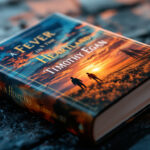We Who Wrestle with God – A Review of Jordan B. Peterson’s Insights
Jordan B. Peterson’s latest book, We Who Wrestle with God, offers a fresh perspective on biblical narratives, diving deep into the meanings behind the stories found in the books of Genesis and Exodus. Through his unique lens, Peterson tackles complicated themes like suffering, moral responsibility, and the search for meaning, often drawing on Jungian concepts and philosophical ideas.
Readers have responded to this ambitious work with mixed feelings. Some find his interpretations engaging and thought-provoking, while others criticize the book for its verbosity and perceived lack of traditional biblical grounding. Regardless of the reviews, Peterson’s ability to connect ancient texts to modern human experiences adds a layer of relevance that many find appealing.
In this post, we’ll explore the themes and ideas presented in We Who Wrestle with God, and discuss its reception in the literary world. Whether you’re a fan of Peterson or just curious about his insights, there’s much to unpack in this complex narrative.
Overview of the Book
Jordan B. Peterson’s We Who Wrestle with God explores profound themes through the lens of biblical stories. By examining narratives from Genesis and Exodus, Peterson invites readers to reflect on their own lives and struggles. He connects ancient wisdom to contemporary issues, encouraging a rethinking of how we view our roles in the world and our moral responsibilities.
Themes Explored in the Book
Key themes in We Who Wrestle with God highlight essential aspects of human experience:
- Individual Responsibility: Peterson emphasizes that we must take ownership of our lives and choices. He argues that true freedom and meaning come from acknowledging our responsibilities, a point that resonates with many readers navigating modern life’s complexities.
- Resilience: The book presents resilience not just as an admirable trait but as a vital skill. Peterson draws on stories of struggle and adversity to illustrate how overcoming challenges shapes our character and imparts wisdom.
- Significance of Mythic Interpretations: Peterson highlights how biblical stories serve as timeless myths, containing lessons that apply to contemporary life. By unpacking these narratives, he brings their relevance to the forefront, showing how they continue to inform our understanding of human psychology and societal values.
For more insights on the themes in Peterson’s work, check out this summary of We Who Wrestle with God.
Jungian Perspective
Peterson utilizes Carl Jung’s ideas to explore biblical narratives, particularly focusing on concepts like archetypes and the collective unconscious. He applies Jungian analysis to stories such as Jacob’s wrestling with God, interpreting it as a reflection of our internal conflicts. This kind of struggle, according to Peterson, illustrates the complexity of personal transformation and growth.
- Archetypal Symbols: Jung believed that certain symbols resonate universally within the human psyche. Peterson taps into this by connecting characters and events from the Bible to these archetypal patterns, making them relatable to modern audiences.
- Psychological Relevance: Peterson argues that these ancient stories reveal psychological truths that remain relevant. By analyzing them, we can uncover deeper meanings behind our emotional struggles and moral dilemmas.
To further explore the Jungian perspective in Peterson’s work, see this discussion on Jacob’s wrestling and its implications.
Key Biblical Narratives
In We Who Wrestle with God, Jordan B. Peterson presents timeless biblical narratives, offering fresh interpretations that resonate with modern audiences. One of the narratives he examines is the Binding of Isaac, a story rich in themes of sacrifice and faith. He also explores the Exodus journey, emphasizing the struggles and liberation of the Israelites. Through these stories, Peterson connects ancient teachings to our daily lives, prompting us to reflect on our beliefs and choices.
The Binding of Isaac
The Binding of Isaac is one of the most profound biblical stories. It illustrates the tension between faith and sacrifice. Peterson reads this narrative through a psychological lens, suggesting that it explores our relationship with the divine and our moral responsibilities. When Abraham is asked to sacrifice his son, Isaac, it raises difficult questions about obedience and the nature of faith.
Peterson argues that this story is not merely about obedience to a command but a deeper meditation on what it means to truly commit oneself to a higher purpose. Sacrifice, in this context, symbolizes the rejection of our own personal desires for something greater. This raises an important question: Are we willing to let go of what we hold most dear in pursuit of our beliefs?
In Peterson’s view, the Binding of Isaac serves as a metaphor for life’s challenges. Moments of great trial often lead us to confront what we value and what must be sacrificed to achieve our goals. Through this lens, the story becomes a call to confront our fears and embrace the struggles required for growth. To explore Peterson’s thoughts on this story in more detail, check out this discussion on the great sacrifice of Abraham and Isaac.
The Exodus Journey
The Exodus journey narrates the Israelites’ struggle for freedom from slavery in Egypt. This story goes beyond mere political liberation; it emphasizes the profound personal and spiritual journey of a people. Peterson highlights themes of liberation and struggle, illustrating how they are intertwined with faith.
The Israelites faced numerous challenges, from Pharaoh’s resistance to the hardships of the desert. These obstacles reflect the often tumultuous path we all encounter when seeking change. Peterson connects this journey to the internal struggles many face today, navigating their own paths to freedom, whether it be from societal constraints or personal limitations.
Peterson’s interpretation encourages readers to consider how the themes of Exodus resonate in our lives. What does it mean to pursue liberation? How do we overcome our personal “Egypts”? Each challenge we face is part of a larger narrative, guiding us toward a more profound understanding of ourselves. For a deeper look into the themes of the Exodus story, visit this captivating resource on understanding Exodus as a spiritual journey.
Through the intricacies of these biblical narratives, Peterson contextualizes the struggles we all grapple with, inviting reflection on faith, sacrifice, and the relentless pursuit of freedom.
Critical Reception
The reception of We Who Wrestle with God reveals a spectrum of opinions, reflecting the complex nature of Jordan B. Peterson’s work. Critics and supporters alike applaud his exploration of biblical themes, while others express concerns about his style and depth.
Praise for Insightful Connections
Many readers laud Peterson for his ability to draw meaningful parallels between biblical stories and modern life. His interpretations resonate with those seeking wisdom from ancient texts in today’s context. For instance, his analysis of characters and narratives sheds light on contemporary struggles, encouraging a deeper understanding of personal responsibility and faith.
- Connection to Contemporary Issues: Reviewers appreciate how Peterson links age-old stories to current challenges. This aspect makes his writing relatable and relevant, showing that these narratives still hold weight in our lives.
- Engaging Exploration of Themes: Positive reviews, such as those found in Christianity Today, highlight how he tackles profound themes like sacrifice and moral dilemmas. These insights spark discussions on how biblical wisdom can inform ethical decisions today.
- Unique Perspective on Biblical Texts: Supporters often mention that Peterson’s fresh take on scripture opens up dialogue about faith and spirituality. His exploration of narratives encourages readers to reflect on their beliefs and challenges, acknowledging that we all wrestle with our convictions.
Critiques of Style and Depth
Despite the praise, several critiques exist regarding Peterson’s writing style and the depth of his arguments. Some readers find his prose unnecessarily verbose and repetitive, which can detract from the overall message.
- Concerns Over Verbosity: Detractors argue that the book’s length and complex sentences may overwhelm readers. The review from The Guardian notes how some passages could be more concise, suggesting that clarity is sometimes lost in grandiose expressions.
- Possible Misinterpretations: Critics also point out that Peterson’s interpretations may stray from traditional theological views. Some feel he oversimplifies complex theological issues, leading to potential misunderstandings of the original texts. For instance, a frequent critique is how his interpretations may lack a robust scholarly foundation, as indicated in various forums like Reddit.
- Repetition of Ideas: Readers have mentioned that the book often reiterates similar concepts, which can feel tedious. The criticism is not about the ideas themselves but their presentation, suggesting a need for more varied examples and insights to maintain engagement throughout the text.
Overall, We Who Wrestle with God invites a rich dialogue among its audience, balancing insightful connections with critiques of its style. Whether viewed through a lens of admiration or skepticism, Peterson’s work undeniably sparks interest and debate in both literary and religious circles. For those looking to explore different viewpoints, check out this in-depth analysis of his work.
Personal Reflections and Insights
As readers navigate through We Who Wrestle with God, many find themselves reflecting on its core messages and how they intersect with everyday life. Jordan B. Peterson’s exploration of biblical stories offers a unique framework for understanding our personal struggles, moral decisions, and the search for meaning. By relating these ancient narratives to modern challenges, he invites us to consider how these lessons can shape our daily experiences.
Lessons on Modern Life: Reflect on how the book’s messages can be applied to everyday challenges.
Peterson’s insights are not just about interpreting stories; they serve as guiding principles for our everyday battles. Readers can draw from these lessons to approach life’s challenges with a new perspective.
- Finding Meaning in Struggles: Life is often fraught with difficulties. Peterson emphasizes that like the biblical figures, we too face moments of intense struggle. By recognizing that these hardships can lead to personal growth, we can reframe our view. Instead of seeing obstacles as barriers, we can perceive them as opportunities for development.
- Embracing Responsibility: One of Peterson’s central themes is the importance of personal responsibility. In a world that often encourages blame-shifting, taking ownership of our choices leads to empowerment. When we acknowledge our role in outcomes, we reclaim control over our lives. This can be a liberating realization, compelling us to take action rather than succumb to apathy.
- The Power of Sacrifice: Sacrifice is a recurring motif in Peterson’s analysis. He prompts us to ask: What are we willing to give up for our goals and beliefs? Whether it’s pursuing a dream or making ethical choices, the willingness to sacrifice personal comfort can lead to profound rewards. This idea resonates deeply in our fast-paced society, reminding us that meaningful achievements often come at a cost.
- Psychological Insights: Peterson’s use of Jungian concepts can help us understand our internal conflicts and motivations. By recognizing archetypes and patterns in our behaviors, we can gain insights into our psychological struggles. This self-awareness can be a game changer in addressing issues of anxiety, fear, or dissatisfaction with life.
- Community and Connection: The narratives in the book also stress the value of community. Just as biblical figures thrived within their communities, we too benefit from connections with others. Building and nurturing relationships can provide the support needed during tough times. Engaging with like-minded individuals fosters a sense of belonging and shared purpose.
These lessons encourage readers to reflect on their daily lives and the challenges they face. For more structured insights on applying these themes, check out 7 Key Lessons From We Who Wrestle With God, which offers practical exercises to internalize Peterson’s teachings.
Jordan B. Peterson’s We Who Wrestle with God serves not only as a deep dive into biblical narratives but also as a manual for tackling modern life. Each lesson encourages introspection and action, giving readers the tools to navigate their unique journeys with purpose and clarity.
Concluding Thoughts
In We Who Wrestle with God, Jordan B. Peterson offers readers a unique lens through which to engage with biblical narratives. His focus on the psychological dimensions of these stories invites deep reflection on personal struggles and moral complexities. As readers wrap up their journey through the book, it’s clear that Peterson’s exploration is both ambitious and challenging.
Overall Impression of the Book
Many readers find We Who Wrestle with God to be an intriguing, if convoluted, reflection on faith, sacrifice, and responsibility. The book’s depth can be overwhelming for some, as Peterson meanders through themes and ideas. Yet, those who persevere often discover insights that resonate with their experiences.
Peterson’s ability to transcend time and connect ancient stories to modern life is a hallmark of his writing. There’s a sense that he compels you to not just read, but also to wrestle with the material. It’s a mix of admiration for his ambition and critiques of the verbosity that surrounds it. Those seeking clarity on complex theological issues may find the text frustrating at times, but it also opens doors to profound discussions on belief and identity.
Who Will Benefit Most from Reading It
We Who Wrestle with God is particularly suited for:
- Individuals Seeking Meaning: If you’re in a phase of life where you’re grappling with purpose and faith, this book may offer valuable insights.
- Fans of Jordan B. Peterson: Those familiar with Peterson’s previous works will likely appreciate his argumentative style and the familiar themes surrounding psychology and morality.
- Readers Interested in Biblical Texts: This book may appeal to those curious about how ancient narratives can shed light on contemporary life. Peterson dives into stories that speak to challenges we all face.
- Jungian Psychology Enthusiasts: If you have an interest in Carl Jung’s concepts, such as archetypes, you will find Peterson’s applications of these theories in biblical contexts compelling.
While readers should be prepared for a lengthy read, they will likely walk away from We Who Wrestle with God with new perspectives on faith, struggle, and the timeless narratives that shape our understanding of the divine. For a deeper exploration of its themes, consider checking out this review by Christianity Today and this summary on Medium that break down his arguments and interpretations.
Conclusion
Jordan B. Peterson’s We Who Wrestle with God offers a thought-provoking look at biblical narratives through a psychological lens. The book connects age-old stories to modern struggles, inviting readers to explore themes of personal responsibility, sacrifice, and resilience.
While some readers appreciate his fresh interpretations and engaging style, others voice concerns about verbosity and a lack of traditional biblical grounding.
No matter where you stand, Peterson’s exploration sparks important discussions about faith and the human experience.
What lessons will you draw from these narratives? Engaging with these themes may lead to deeper reflections on your own life’s journey and beliefs.







